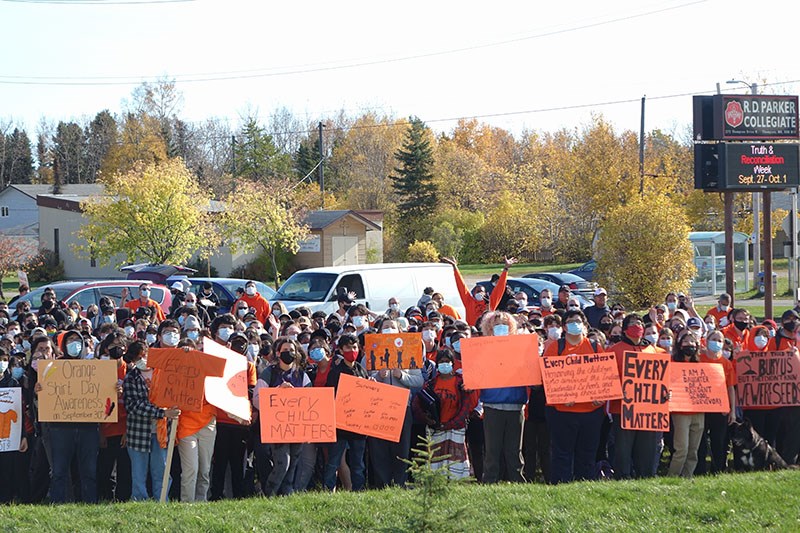R.D. Parker Collegiate capped a week of truth and reconciliation activities with a ceremony and memorial walk Oct. 1 to honour residential school survivors and those who never made it home.
The event came one day after the first National Day for Truth and Reconciliation, which was established as a federal holiday earlier this year.
Students heard memories from a pair of residential school survivors – Rose Hart and War Lake First Nation Chief Betsy Kennedy.
Hart recounted the overwhelming emotions as children bound for residential school went to the train station in The Pas.
“There was nobody to take care of the children, just the conductors,” she said, recalling that many of the children were crying at being separated from their parents.. “They called it the train of tears.”
Kennedy said her father had to ask her if her name was Betsy to be sure she was his daughter when she finally came home because she looked so different from when she left.
“I didn’t come home for four years,” she said.
School District of Mystery Lake co-superintendent Lorie Henderson told students that her father was a residential school survivors, but it wasn’t something they ever talked about when she was growing up. After he did, she requested his residential school records in hopes of learning a bit more about his childhood.
“What I got was his attendance and I saw when he went home. That was what was in his file. He was very much just a number.”
More than 150,000 children were forcibly removed from their families to be taken to residential school over the life of the system, which only ended in the mid-1990s.
“They were taken away forcefully, taken to strange facilities where they faced untold hardship,” said Manitoba Keewatinowi Okimakanak Grand Chief Garrison Settee. “They suffered, they starved, they were beaten, they were abused in ways we can never imagine. Thousands of them never made it home, they died in those schools. That’s why we’re here to honour them for what they went through. You’re the generation that will teach the next generation what happened in these schools. We can never repeat that kind of history.”
Though the residential school system was abolished, echoes of it remain in Northern Manitoba, where many First Nations don’t have kindergarten to Grade 12 schooling within the community, said Mayor Colleen Smook, noting that some of the students she was addressing came to Thompson to continue their education once they finished Grade 8.
“We have to have that knowledge so that we make sure everybody is respected and treated in a great way.”
Reconciliation isn’t a one-time thing, said RDPC vice-principal Jeff French, so the school has more activities planned for throughout the school year.
“We realize the reconciliation is not something that can be limited to just one week.”






